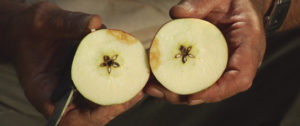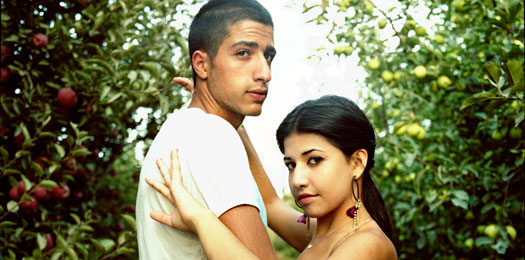By Aurora Tellenbach
Given that the Apples of the Golan is a film with many voices, it may seem like a provocation to open with such a vocal Assad supporter; more so given the atrocities perpetrated by the Assad regime against the Syrian population during the ongoing uprising. But for this loyal supporter, no criticism of Assad is justified for he hopes and dreams of the Golan Heights being reunited with the motherland of Syria. Surrounded by children from the Druze village of Majdal Shams, he points across the valley to Syria calling Assad the protector of their homeland.
A man who was tortured by the Syrian police however, soon contradicts his opinion. Wishing to visit his fiancé, this man crossed the border into Syria secret. Fully aware that he might not be received with open arms in Syria, he did not expect to be accused of being a Mossad agent. His description of the torture he had to endure during the Syrian interrogation is beyond imagination.
Since the Israeli occupation of the Golan Heights in 1967, the border between Israel and Syria has been closed. With the exception of apples, brides, students and pilgrims nothing else is permitted to cross the border into Syria. The few remaining Arab villages in the Golan Heights rely on the apple harvests as their main source of income. The only exports from Israel to Syria are the apples grown in the Golan Heights and it is only made possible under the protection of the International Red Cross. The apples represent an income as well as a political statement of a continued belonging to Syria. Apples of the Golan is the story of the people living in a village where the apples are not just their livelihood but also a symbol of freedom and a sense of belonging. For the apple delivery driver, the Syrian people’s demand for this produce is testament to their solidarity with the people of this occupied village.
 Although the apples and the Israeli occupation form a thread throughout the film, many of the stories are also about the social constraints within the village and the Druze community. The gender focus is heavily male; the opinions of the young men are quite different to that of the older male population. Born after the occupation of the Golan, the younger village males were offered Israeli citizenship that their parents refused. Unable to claim Syrian citizenship these young men were left with passports that stated their nationality as ”Undefined” which create serious identity issues and an absence of belonging. Enclosed by a closed border, Israeli troops and the risk of social ostracisation if they decide to accept Israeli citizenship, they are trapped.
Although the apples and the Israeli occupation form a thread throughout the film, many of the stories are also about the social constraints within the village and the Druze community. The gender focus is heavily male; the opinions of the young men are quite different to that of the older male population. Born after the occupation of the Golan, the younger village males were offered Israeli citizenship that their parents refused. Unable to claim Syrian citizenship these young men were left with passports that stated their nationality as ”Undefined” which create serious identity issues and an absence of belonging. Enclosed by a closed border, Israeli troops and the risk of social ostracisation if they decide to accept Israeli citizenship, they are trapped.
Apples of the Golan also plays with contrasts. Where the younger population is left with an undefined identity, a newly released prisoner is still after nearly thirty years a strong supporter of armed resistance against Israel. His determination and belief in reuniting with Syria is undeterred.

As a third of Israel’s water supply originates from the Golan Heights, both apples and fish are having difficulties surviving. Images of Lake Ram show how the fish is floating on the surface as the water level continuously falls. Looking out over lawns and orchards at the Ein Zivan kibbutz, a former Arab village, everything seems green and prosperous. A Jewish settler from Argentina is aware of the history behind the kibbutz, but like many Israelis in occupied territories in Palestine, he rather looks to the future than talk about the occupation.
The film does not provide any solutions, but shows a spectrum of voices. Its strength is in its diversity although it would been have enriched with more women’s voices in addition to the bride that made her only journey across the border to marry a man from the Golan Heights.
Apples of the Golan will be screening as part of the 2013 London Palestine Film Festival at the Barbican Centre on Sunday 5 May 2013 at 8.45pm. It will be followed by a screentalk with Keith Walsh. Click here for more information.
Aurora Tellenbach is an arts project manager mainly working on stage productions with cross-cultural themes. Formerly a broadcast journalist, Aurora is now in the process of completing a PhD on Mapping Migration in Contemporary Arab Cinema (2000-2010). She has lectured on the same subject to postgraduate Film Studies students and has conducted extensive fieldwork in North Africa and the Levant.
